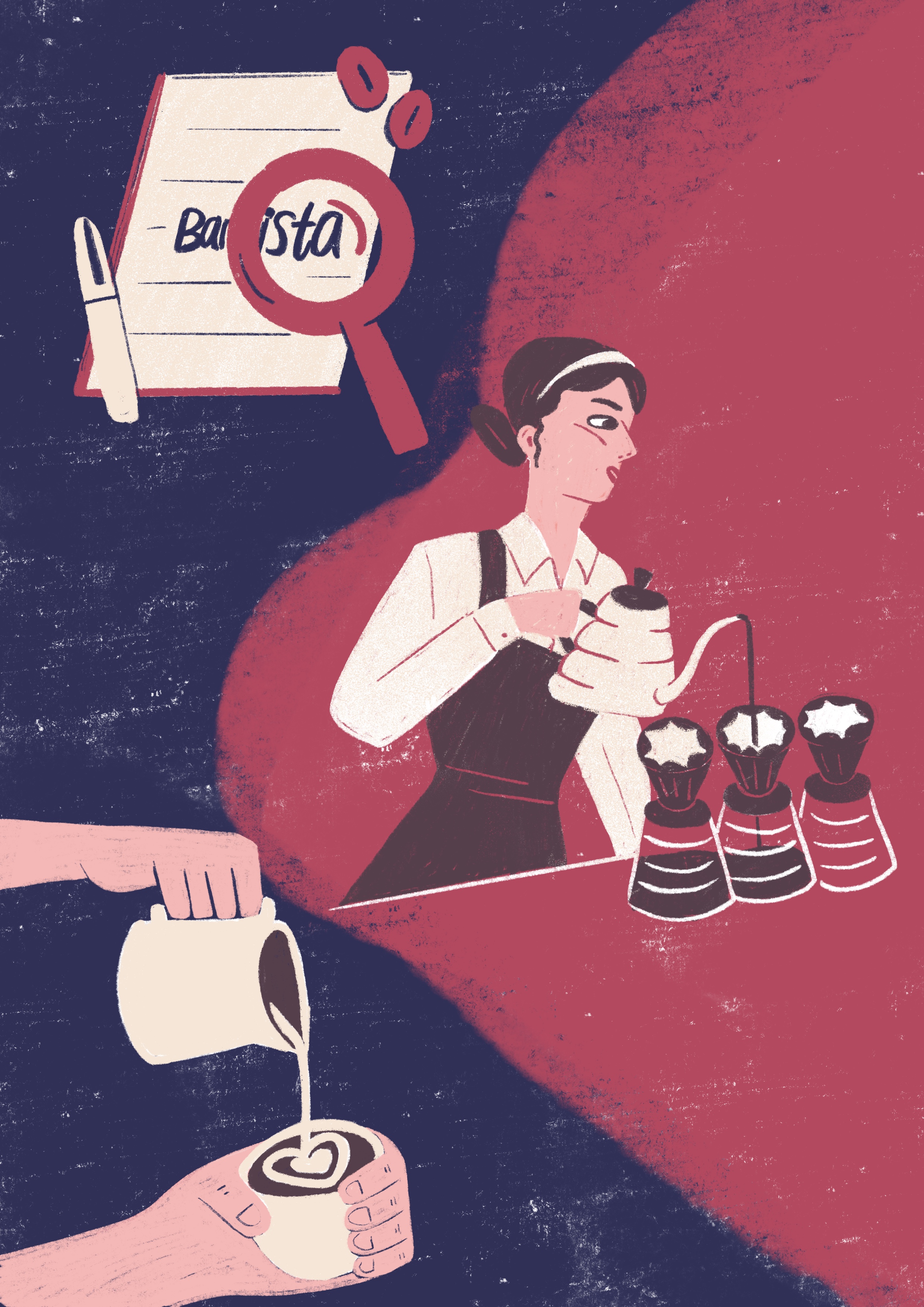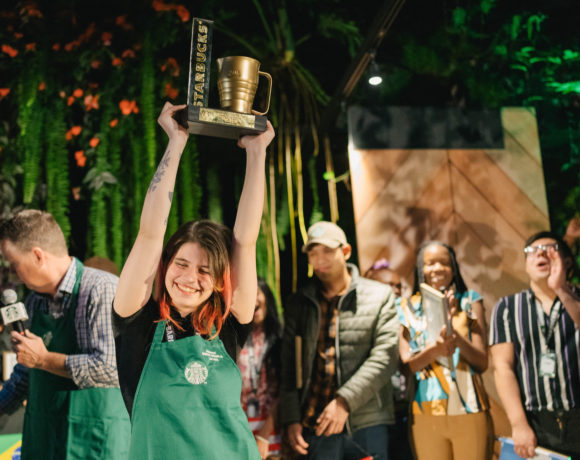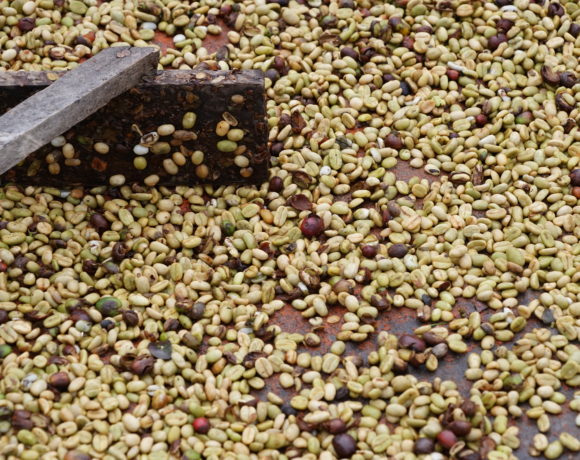As coffee became daily essential in our life, people started to get to know more about barista behind the bar who specializes in making and serving coffee and other beverages in a coffee shop, bar or restaurant. Unlike in the traditional markets, such as Italy, there are many baristas who have dedicated their lives to the job. With the booming café culture, it has become one of the trendy jobs in big cities in China. Being a barista and working in the warm and friendly environment could be interesting and rewarding at the beginning of your career, it opens the door of the coffee world.

The start of my coffee career
I was very lucky for making a career out of my first part-time job. Back to my school days, after I tried all kinds of part-time jobs: delivering brochures, tutoring, etc. but nothing was too exciting. By coincidence, I was introduced to a translation job, it was to help to translate a coffee brand brochure and a coffee operation manual. I remember vividly, the very first word I needed to look up was “Barista”, I couldn’t find anything in the dictionary, no result after searching on Baidu either. As we always had a phrase for “Tea Ceremony Master” for my knowledge which has been translated into “Cha Yi Shi”, so I translated “barista” to “咖啡师”, a coffee master.
The day I went to deliver the translation in the coffee shop, I filled my application for the part-time barista job. From there, I had my first cup of Espresso and Americano… I learnt how to roast coffee, what makes a good blend for Espresso. There was always something new to learn, everything was fascinating. Without hesitation, I took the store manager role when I was offered right after my graduation instead of a job to work as a tour guide or work in a five-star hotel. Since then, I did retail operations, sales, marketing, coffee Non- profit program, business development, green coffee sales and then green coffee trading.
How it was like to be a Barista in 2007 in China?
The daily routine of a barista in 2007 was more or less the same as it is today, we got paid by hour, so the more hours you work the more you get paid, we were trained to make and serve coffee, tea and other beverages, as coffee was not very common, we didn’t even have Starbucks until 2011 in Kunming, so we spent a lot of time explaining and educating our customers about every little thing we know about coffee, i.e. what is espresso, what’s the difference between an Americano and a Latte. The latte art didn’t exist in our world then, we were so proud if we made a heart shape for a latte. We were also required to help with inventory, running a cash register, coffee machine sanitation, cleaning and problem solving on the daily basis. Most of us considered the job more of a temporary job, something that could fill the gap before finding other full-time jobs.

How’s the barista job market today in China?
Among baristas in China coffee industry, age between 19-25 years old accounts for the largest proportion while the proportion of 26-35 years old baristas has been increasing, and the number of female baristas takes up about 40-43%. It seems normal that baristas change jobs more frequently than other jobs. According to some reports, this situation has improved slightly in recent years, which indirectly shows that the profession is gradually stabilizing. The wage of baristas is generally between 3000-6000 RMB, it varies from different cities in China. Moreover, the monthly break time of baristas has been increasing year by year, and many baristas in Shanghai started to gets 2 days off weekly, but in some other cities, they may get only 4-6 days off every month.
Although we are seeing more and more coffee shops, meaning more barista jobs are filled, but from what I heard in the conversations I had, in reality, very few would stay in the job for more than 3 years unless it’s bigger coffee chains where they can move up or get into new roles in the company system. Or some barista who is really passionate about coffee they would choose a path of professional coffee career: participate in coffee competitions, barista competition, cupping competition, Latte art competition, etc. Of course, any kind of competition then will require much more dedication and effort, as a result, this will lead them into a different career path.
For baristas who work in the independent coffee shops, normally they would change positions in different coffee shops, ending up going back to their hometown to open their own coffee shop, or getting other jobs that would give them life purpose. Because too many people being a barista is often considered as a demanding, low paid job, that’s why it usually gets picked as a short-term option because it’s hard to support pursuing a desirable career. “ Xiao Xiao, a barista near my office told me that she is regularly asked by her parents and friends: “When are you going to get a real job?”. No one asks a chef when is she or he going to get a real job. I reckon that’s also why so many baristas value the SCA certificates, it shows that it’s a skilled job that you get trained for.

Passion will take you there
In general, changes need to take place in the industry around minimum wage levels. Some coffeeshop owners trying to pay as much as possible for the barista job, but it’s still never going to be the highest-paid job in the world. But we all believe that as long as there is room in the industry for coffee, business will keep growing. There is room for individuals to progress and be promoted within a company and make a career of it.
Austin, who is an engineer with La Marzocco Shanghai, started as a Barista in Kunming back in 2010, at first, it was just a job for him, he complained a lot about 2-4 days break for a month was tough days. He liked to drink Latte but didn’t have much in his head for what this job could lead him to, he later used an opportunity to learn how to roast coffee for the coffee shop and the wholesale coffee beans for the shelf, as well as some other cafés … it opened the world of coffee to him from there. He decided to move to Shanghai in 2017 at the age of 25 to help a friend with a newly opened specialty coffee shop, where he started to work with this trendy looking La Marzocco espresso machine which was fascinating to him…
A year later, he got a job with La Marzocco, “I think I have found my dream job now. I love being a barista to make a cup of nice coffee and hand it to my customer, and I also enjoy the process of learning different coffee coming from different origins… because of those experiences I had in the past, I know that a good coffee machine is a final stop and key point of that cup of coffee will be handed to the final customer. I only can do my job well because I know that every job has a purpose and they all matter.”
A coffee chain hiring-manager once told me: “When we hire, we look for passion and interest, there’s so much to learn in coffee, but as far as a barrier to entry is concerned, it’s still like any other jobs where companies want you to demonstrate a passion for what you do, after all, you will be provided with resources and training to do your job.
Barista Alex told me: “The best decision I made in coffee, was to align a career with what I love. “I seek out companies to work for that I would really enjoy spending my time for. I met many coffee friends who got into the coffee industry from being a regular customer in a coffee shop, and it made difference.”

Be prepared to turn your coffee job into a career
Professional baristas are in high demand these days and it can be a competitive industry, too. Many coffee shops hiring managers would also look for individual qualities such as good listening and communication, problem-solving and customer service skills. Barista works closely with customers, so it is good to have those abilities or get trained on the job to have them, have an outgoing personality, and present those qualities in a professional manner.
A barista also needs to be able to prioritize and multitask in a fast-paced environment. He or she may encounter machine problems or have unhappy customers, therefore it requires the barista to be able to work under pressure and multitask well. Take orders, prepare hot and iced beverages, pack take-away drinks and serve them, in some coffee shops may even need to serve food and clean tables at the same time.
However, if you’re not interested in having a career in coffee, most of those skills are not only useful when you are a barista, you still get transferable experiences for your future jobs, those skills can be applied even to other jobs in the supply chain or other industry, to have the fundamental qualities will certainly open doors for you. You will be able to use your entry-level barista skills to build up your resume, with that you can go into food retail and your experience will give you sales and customer service experience. If you are still a student, holding a barista job whilst managing your university study is a perfect way to learn time management skills: managing shifts, commute time, academics, building relationships.
If you are eager to learn more in-depth techniques, there are numerous baristas or other coffee-related programs and training courses that have popped up due to the popularity of the coffee business, the advanced world gives you the access to learn as much as you want about the coffee career field. Such as coffee brewing, equipment maintenance, latte art, coffee roasting, cupping, even coffee business operation. Advancing to further in the career path it may require some additional education to gain more knowledge or for a diploma, more than often, specialized programs, business degrees, or coffee education programs. This may allow you to open your own coffee shops or pursue advanced roles within the coffee industry, quality control, R&D, green coffee trading, coffee sourcing…there are so many relevant jobs in the whole supply chain.












NO COMMENT